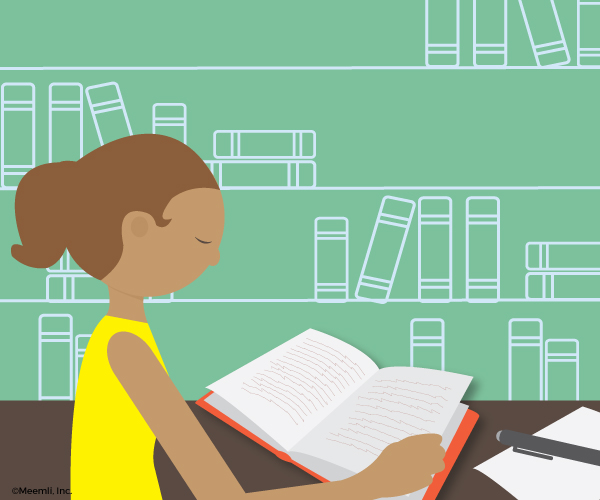Month: August 2019
A Teacher’s Tip for Back to School: Start Reading!

(A teacher’s perspective and another favorite of ours!)
Sleep in. Stay up late. Play video games…all day.
According to my high school students, they’d like to spend their summer vacation. Now, the reality may be different (parents?), but the freedom and possibility that summer represents to children – to all of us – is very real. Another very real thing: back to school has kicked off around the country.
But luckily, the freedom and possibility that make us love summer can also help your child successfully transition back to school, reading, perhaps even with a greater appreciation for it.
Why Read
If you found your way to this blog, fantastic! You are probably already convinced of the importance of reading for academic success. And mountains of research back you up. A Department of Education study assures us that families play a big role because the amount of reading done outside of school can greatly impact a student’s success in school.
Unfortunately, academic skills often decline over the summer. If your child has read nothing but tweets and fortune cookies all summer (ok, it happens), they might have begun a trip down the summer slide. But don’t panic. You still have time to get them back on track.
How To Read
In short: build stamina. From my experience, the first couple of weeks of school doesn’t pass without at least a couple students reminding me that my 8:45 English class is happening at least a couple hours before they’re supposed to be awake. But teachers often expect kids to hit the ground running. So begin to help your child find a reading routine. The reading requirements that are awaiting them in English class, social studies, science, economics, etc. will be much easier if your child is already accustomed to reading daily.
Now, if your child hasn’t been reading consistently this summer, start small. Fifteen minutes is probably about right for a middle or early high school student. They can do it. They will build from here, to 20, 25 even 30 minutes. Wouldn’t it be wonderful if your child started this school year reading 30 minutes daily? This is probably one of the most important things that you, as a parent, can do to support your child’s success in school this year.
What To Read
As a teacher, I have asked a student what he or she like to read and been told, “I dunno” innumerable times. Ah, yes. Often, behind the sullen, frustrated or bored tone is a child who genuinely doesn’t know what he or she likes to read. Don’t give up if you get this response!
I’ve found great success asking students about their favorite TV shows or movies and tying them to genres and books. Fans of Walking Dead can Google “young adult (YA) zombie novels.” Is Gossip Girl their thing? Run a search: “books like gossip girl.” Jurassic World? Ender’s Game? Hey, these two were originally books, so that’s easy! (Also, your local librarians would love to help your child find a book. They live for these moments.)
Don’t be disappointed if your child isn’t interested in “important authors” like Shakespeare, Hawthorne or Melville. That’s what school is for. Generally, in class, your child will be reading more difficult texts that are not easy to relate to or understand. Independently, your child should be able to choose. Shakespeare’s great, but he’s not at the top of my personal summer reading list either.
Remember, it doesn’t matter if you want to read this book or not. It matters that they do.
Where To Find Resources
Time to tap the Internet. There are many great online resources that can help your child become a better reader (I could do a whole post on them) and here are some good ones to get started.
Check out YourNextRead.com which features long lists of “to read” books for many of my students who “don’t like to read.” GoodReads.com also has hundreds of lists of books for every taste.
Then there are the sites with high-quality content, especially non-fiction, aimed at middle and high schoolers, here are a few:TeenInk (written by teens), NY Times Learning Network, Smithsonian’s TweenTribune.
Final Tips
It’s a simple thing, but reading logs can be a great motivator. From reluctant readers to bookworms, reading logs satisfy. It’s just gratifying to see how much you’ve read. You can find printables online, or simply keep track of the basic info on a piece of notebook paper: book title, start/end pages, and amount of time read. Do what seems most motivating for your child.
Discuss the books with your child to help develop deeper understanding – ask about the main idea, the plot, the characters, what the author is trying to achieve etc. (Think your child may need help with reading or writing? Check out free reading and writing assessments on Meemli Academy or just contact Meemli.)
And my favorite: read with them. Can you find fifteen minutes to actually sit down and read too? The most successful reading program I’ve ever experienced was at a school that had daily reading time during which the teachers were also required to drop everything and read. No email, no grading, no lesson planning, just read for pleasure. It was transformative for everyone. You can be a role model and inspire your child to read by doing it yourself.
What are your tips to get your kids reading? We’d love to hear them!
30 Aug, 2019
Plan To Enjoy The New School Year

(We’re re-sharing another of our annual favorites – take charge of your new school year!)
Does it feel like summer’s gone, though the calendar doesn’t say so? Are you beginning to feel stressed? Could be because your summer break’s ending (104 days, calculated according to Phineas and Ferb). Good news – being back to school is not all bad! Understandably, starting a new school year and getting adjusted to a new schedule can make you tense, but with the right approach, the new school year can be more enjoyable than you expect.
Here are some simple tips that can make all the difference on how you feel about getting back to school and starting a new year/grade.

Check Your Attitude.
There are plenty of ways that you can mentally prepare for the upcoming year. Try to approach the year with a positive attitude – just think of all the fun experiences you’ll have along the way! For example:
- School’s the only time in your life you get to see so many of your friends every day.
- You can reconnect with your favorite teachers and maybe you’ll get some new ones.
- You get to do extracurriculars and school activities – with friends!
Depending on how you’ve spent your summer, going back to school might feel like a complete turnaround, so it’s worthwhile to set aside some time to refocus yourself. According to the American Psychological Association, mindfulness can be defined as “a moment-to-moment awareness of one’s experience without judgment.” Mindfulness techniques come with a whole host of proven psychological benefits, like stress relief, increased focus, and better memory. While it may not suit everyone, it might be worth a look and a discussion with your parents on whether you should try it!
Make A Plan.
A new year means a new schedule, and a new schedule always takes some getting used to. We know you’ll be busy between your school and your extracurricular activities, but the amount that you’ll enjoy the upcoming year depends on your ability to budget your time. Make a plan ahead of time to reduce your stress and help you feel on top of your school life, instead of being burdened by it.
Part of making a plan is taking into consideration what is hard for you and what is easier. Keep that in mind as you make choices, if writing reports takes more work, make a note to yourself to always get started earlier on your reports. If you tend to get tense about tests, cut yourself some slack and don’t schedule too much the evening before one. When you’re making a detailed schedule, which you should (and parents should help their younger children with this), use your planner to keep track of all your commitments, not just the ones for school.
Finally, make your plan bigger – think about what you want to get done at the end of the school year. If possible, mix in personal goals (want to try out a new sport) with academic ones (want to improve writing skills) and even social ones (make new friends) and think about how you can go about achieving them – you have the whole new year ahead of you to work on them!
Use Your Support Network.
Even if you’re mentally prepared for the new year and have everything planned out, you can be sure that things will come up unexpectedly. Maybe your teachers pile on some extra assignments all at once, or you miscalculated your time and your weekly schedule is all out of whack. And of course, there are all the social pressures that come with school that can sometimes feel overwhelming.
When things get tough, go to your support network. It can be a combination of friends, family, teachers, coaches, anyone you trust to have your back and give you the support you need and the advice you seek. Don’t be afraid to lean others from time to time, but be ready to repay the favor when someone needs to lean on you.
Keep in mind, if the pressure gets to be too much, don’t hesitate to see speak to trusted adults and request professional help. There is no shame in that (it happens to millions of people worldwide) and getting the right kind of support can help you feel a whole lot better.
These are just a few of the ways you can get ready to make the most out of the new school year. To kick it off, check out this song, a blast from the past you can listen to while you start planning your future. What are your favorite ways to get ready for school? Let us know in the comments below!




